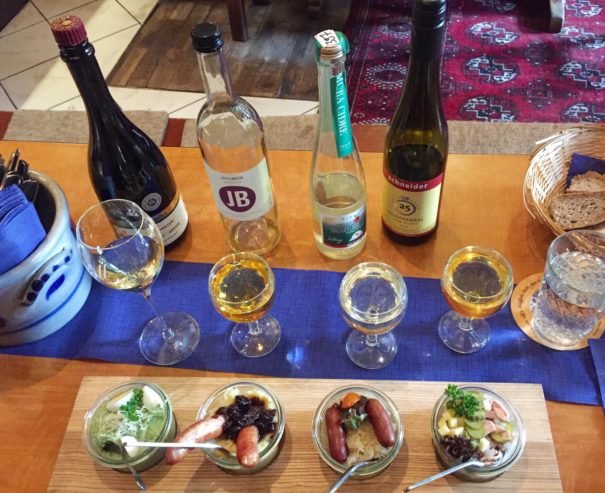
A Sour Wine That Pairs Well with Sausages, Jet Lag, and Depressing Elections

A Sour Wine That Pairs Well with Sausages, Jet Lag, and Depressing Elections
Apfelwein in Frankfurt
It was the first round of the French elections, and I happened to be in the Schengen Zone—the 26 European nations without border controls between them—fresh off the plane from the United States. Frankfurt, Germany, to be precise. After chatting with people and getting through the requisite rounds of “Congratulations on your new president!”—which was funny, but also not funny—I sought out an apfelwein tavern to drink off the jet lag.
Specific to Frankfurt and its environs, the apple wine tradition was something I knew nothing about before arriving. Taverns are built in traditional Hessian style, meaning they could almost look like tourist traps in Frankfurt, a modern city with one of Europe’s only skylines. But they turn out to be anything but a touristy experience—though they can definitely be a trap if you find yourself in the right conversation.
Traditionally served out of a ceramic jug called a bembel and nowadays out of wine bottles, the wine is tart. It’s made from mainly Granny Smith or Bramley apples, and is not carbonated. It tastes like flat cider. It clocks in at around 4.5-7.0 percent ABV, making it a decent alternative to beer. Locals love the stuff, and it’s easy to see why. It pairs well with sausages, potatoes and the local specialty, Grüne Soße, which is an all-purpose, viscous green sauce made from various herbs and sour cream or creme fraiche. Heading to an apfelwein tavern is a classic happy-hour activity and, as it happens, I was looking for just such a thing to do.
The majority of the apfelwein taverns are in the hip neighborhood of Sachsenhausen, just across the river Main from the city’s business district. I ducked into one next to a British pub loudly playing “November Rain,” which seemed like a good omen. There was a solitary television, occupied by Frankfurters anxiously watching live commentary on the ongoing French election.
Everyone there said they were horrified by the resurgence of fascism-disguised-as-populism that reminded them of their country’s history. They acknowledged that Brexit could cause a surge of business for Frankfurt, but commented that Germany’s problems at home were big, maybe too big to be solved. They took in too many refugees, two people thought. Nobody knew what to do about the fact that the 63 percent of Turks living in Germany—many of whom have been there for three generations—voted “Yes” in Erdogan’s recent referendum stripping the Turkish government of many of its democratic institutions.
We drank long into the night, eventually forgetting about the ongoing vote count and focusing on more mundane matters, like impending nuclear war and the hopeful existence of Kompromat urine tapes. Eventually, someone gasped. We all looked at the TV, where the results flashed on the screen: a run-off between Le Pen and Macron, who were in a dead heat at 21.53 percent and 23.75 percent of the vote, respectively. Someone walked out of the tavern, letting a cold breeze cut across the bar. Nobody had anything to say—an atmosphere I remembered well from last November—and so we all settled up and went our separate ways.